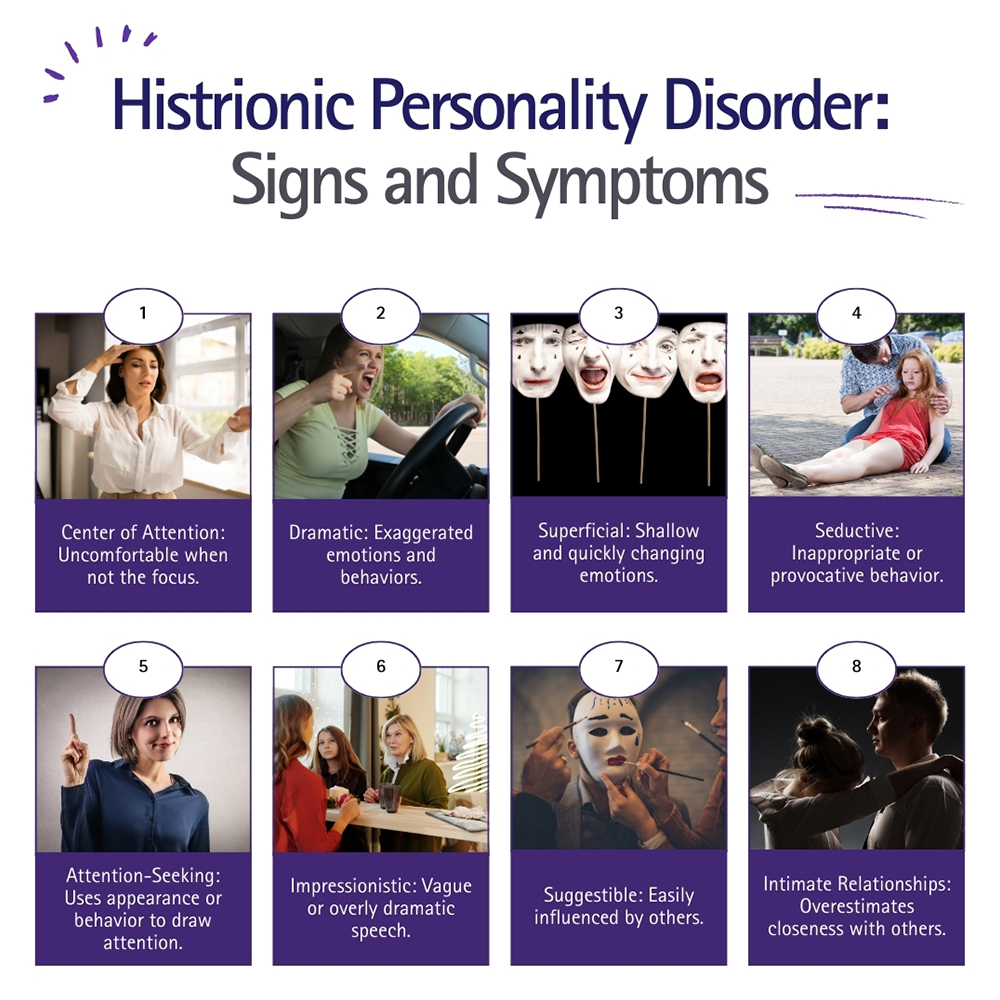What Is Histrionic Personality Disorder?

Histrionic personality disorder (HPD) is characterized by intense emotionality and persistent attention-seeking. People with HPD often feel unappreciated when they are not the center of attention. They may be charismatic at first, but when they are not receiving attention, they may do something dramatic.
Who Does Histrionic Personality Disorder Affect?
HPD can affect people of all genders, races, socioeconomic status, and cultural backgrounds. HPD typically becomes noticeable in late adolescence and early adulthood, however can affect adults of any age.
Embrace Healing The Power of Trust in Therapeutic Relationships
“In my experience, the most effective aspect of therapy is the therapeutic relationship. Establishing trust between a client and clinician is the first step to healing.”
What Are the Signs and Symptoms of Histrionic Personality Disorder?
Symptoms of HPD include:
- Being uncomfortable in situations they are not the center of attention in
- Interactions with others are often characterized by inappropriate seductive or promiscuous behavior
- Rapid shift of emotions
- Using physical appearance to draw attention to self
- Speech that is impressionistic and lacking in detail
- Dramatic and emotional behavior
- Easily influenced
- Considering relationships to be more intimate than they are
Individuals with HPD may struggle to achieve emotional intimacy because on one level they may seek to manipulate their partners and on another level, they may be dependent on others.
Signs of HPD include:
- Excessive attention seeking
- Overly impressionable
- Difficulty with boundaries
- Inappropriately seductive
- Dramatic speech and expressions
- Easily bored
The presence of these signs and symptoms does not mean someone has HPD. A licensed clinician should diagnose HPD in a safe therapeutic setting.

What Causes Histrionic Personality Disorder?
HPD can have several causes including:
- Genetics: Individuals with a family history of HPD or other mental illnesses may be more likely to develop histrionic personality disorder.
- Trauma: Traumatic events in early childhood such as emotional abuse along with trauma bond or neglect may contribute to the development of histrionic personality disorder.
- Modeling: Sometimes individuals who have been raised by caregivers who have histrionic personality disorder tendencies may model this behavior.
Having these risk factors does not necessarily mean you will develop this condition. Clinicians at the Trauma Therapy Center are experienced in working with personality disorders, especially HPD, and understand the complexities of this disorder.
Who Diagnoses HPD and How?
HPD is diagnosed by a licensed and qualified mental health professional such as a psychotherapist or psychologist.
Your therapist can diagnose HPD in the following ways:
- Assessment: Your therapist will ask questions about your symptoms, family and personal history, and behaviors.
- Diagnostic criteria: The clinician may use diagnostic criteria from the Diagnostic and Statistical Manual (DSM-5) to assess your symptoms.
- Assessment tools: Counselors may use standardized assessment tools or questionnaires to help identify HPD traits.
- Differential diagnosis: Mental health specialists will consider other possible diagnoses or explanations for symptoms to rule out other diagnoses.
- Collateral information: With your permission, a psychotherapist may talk to your family members or loved ones to help diagnose and treat your condition.
Histrionic personality disorder must be diagnosed by a licensed clinical mental health provider. After diagnosis, you and your therapist will create a comprehensive individualized treatment plan tailored to your needs and challenges.
What Is the Treatment for Histrionic Personality Disorder?
The two main types of therapy used to treat HPD include:
- Psychodynamic therapy: This form of therapy addresses the roots of the problem and helps process emotional distress.
- Cognitive behavioral therapy (CBT): CBT helps clients identify and challenge their negative thoughts.
You are not alone in dealing with your HPD symptoms. With the help of one of the licensed and skilled therapists at the Trauma Therapy Center, you can begin to express your thoughts and feelings clearly and concisely.
What Is the Best Medications for HPD?
Medications used to treat symptoms of HPD include:
- Antidepressants
- Mood stabilizers
- Antipsychotics
However, medication alone cannot treat HPD and the best treatment is a combination of therapies.
Is Online Therapy Effective for People With Histrionic Personality Disorder?
Online therapy is highly effective for HPD. According to the research, online therapy is just as effective as in-person therapy for personality disorders.
If you, or someone you know, is dealing with histrionic personality disorder, a combination of psychodynamic therapy, cognitive-behavioral therapy, and medication is essential. Schedule a BPD therapy appointment in West Palm Beach by contacting the Trauma Therapy Center

